Bouncing back, not an easy task for UNP
By Jaliya WIJEYEKOON
 |
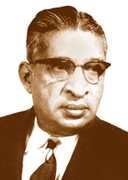 |
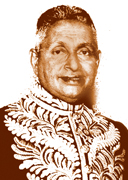 |
 |
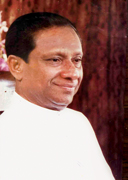 |
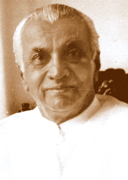 |
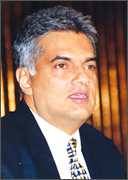 |
| D.S. Senanayake |
Dudley Senanayake |
Sir John Kotalawala
|
J.R. Jayawardene |
R. Premadasa |
D.B. Wijetunga |
Ranil Wickremesinghe |
The United National Party (UNP) was formed by its founder leader on
September 6, 1946 at Palmcourt, Albert Crescent, Colombo with an initial
200 membership. It was called the United National Party since all
community leaders represented this new movement.
D.S. Senanayake who had a great vision for the future of the country
organised the party properly with the help of office-bearers of the
party such as S.W.R.D. Bandaranaike, T.B. Jayah, Arunachelem Mahadeva,
S. Nadesan, J.L. Kotalawala, George E. de Silva, A.R.A. Razik, Dudley
Senanayake and J.R. Jayewardene.
The new party progressed rapidly and became a force to be reckoned
within Sri Lanka's political arena.
At the election, in 1947 the UNP emerged victorious and the Right
Honourable D.S. Senanayake became the first Prime Minister of then
Ceylon. The greatest achievement was winning independence in the
immediate next year - 1948. D.S. governed the country only a little over
three years and had a sudden death falling off the horse-back while on
his regular exercises at the Galle Face Green.
After D.S. Senanayake's death his eldest son Dudley who was the
Agricultural Minister in the cabinet was appointed Prime Minister and
the Leader of the United National Party. Dudley contested the election
in 1952 and secured a two-third majority in Parliament under his able
stewardship.
However, with the passage of time some developments took place in the
party and S.W.R.D. Bandaranaike broke away from the party and formed the
MEP. Sir John Kotalawala was not very happy with Dudley's leadership and
was away from the country for a brief period and wrote a book titled
Agamethi Parapura. He returned to the island and had constant conflicts
with Dudley over various issues.
Dudley who was a mild-hearted person though a Cambridge Scholar,
stepped down from the leadership and politics paving the way for Sir
John to take over the reins, claiming a prolonged stomach ailment.
Sir John who was a very straightforward, outspoken, tough and rigid
leader ruled the country for a few years and at the next election the
party was reduced to eight members. That was the first debacle suffered
by the UNP. Sir John never came back to politics and lived in isolation
till he passed away in 1979. However, the UNP was in and out of power
from Parliament on four occasions under the stewardship of Dudley
Senanayake until 1970 where the UNP had the second worst debacle. Dudley
Senanayake passed away in 1973 and the undisputed deputy leader, J.R.
Jayewardene took over the leadership and geared the party to its
historic five-sixths victory in 1977. J.R. became the premier and
changed the constitution and became the Executive President in 1978.
From 1978 there were dramatic changes in all spheres of life.
JR's second term was not very rosy as there were two uprisings. The
LTTE movement was rapidly gaining ground in the North while the JVP
reactivated their movement and started killing people indiscriminately.
However, JR under his astute leadership temporarily suppressed both
struggles till he completed his second term.
Thereafter, Ranasinghe Premadasa took over the leadership and
contested the Presidential election and won amidst two major problems.
The JVP in the South and the LTTE in the North. In addition to these two
problems, he had to face an impeachment motion brought in Parliament by
his own party stalwarts supported by the opposition. However, he sailed
through turbulent political waves driving away his opponents to the
political wilderness. Although he escaped the coup, that was the turning
point of the downfall of the UNP which had been steadied by his
predecessor J.R. Jayewardene. Prime Minister Premadasa faced an untimely
death on May 1, 1993 and D.B. Wijetunga, the then Prime Minister became
the President and Ranil Wickremesinghe became the Prime Minister.
In 1994 the general election was held and the People's Alliance
formed the government under the leadership of Mrs. Chandrika Kumaratunga
with the support of the Muslim Congress headed by M.H.M. Ashraff. At the
subsequent Presidential election Chandrika Kumaratunga was elected as
the fourth Executive President of Sri Lanka with a huge majority.
Ranil Wickremesinghe became the Leader of the Opposition and the
leader of the party in 1994 and since then it has been a pathetic
situation in the United National Party. However, under his stewardship,
the UNP won the 2001 general election which they could not consolidate
and continue due to the shortsighted policies of the leader. The
controversial peace accord he signed with Vellupillai Prabhakaran even
without the knowledge of his own party but with the blessings of foreign
powers also contributed to his unpopularity and the party to a great
extent.
The results of all subsequent elections revealed that the popularity
of the United National Party steadily declined not only in rural
agricultural areas but also in the cities and suburbs. Certain districts
which were supposed to be the main UNP strongholds also had been won by
the UPFA at the last general election.
With the defeat of all elections Ranil's leadership was challenged by
party stalwarts saying that he was mainly responsible for the defeat.
With the string of successive defeats a large number of party members
joined the ruling party saying that the UNP will never come back to
power as long as Ranil remains the leader of the party.
Unlike in previous defeats, the recent humiliating defeat suffered by
the party caused innumerable problems to the leadership. Some of the
able lieutenants who defended the leader on previous occasions also did
not win their seats in Parliament.
Ranil's leadership is again being challenged and some party leaders
claim that Sajith Premadasa should be the party leader to steer the
party to victory at a future election.
The Sunday Observer contacted some of the district leaders of the
party to ascertain their views, the present position and the future
course of action of the party.
Rukman Senanayake, Kegalle district -
|
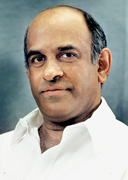
Rukman Senanayake
|
|
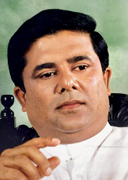
Vajira Abeywardene |
Q: Your party suffered a great loss at the last election. What do you
think of the reasons for such a debacle?
A: There may be number of reasons but the main reason is the wrong
decisions and the shortsightedness of Ranil Wickremesinghe who does not
consult political matters with others. According to our party
constitution all powers are centred around the leadership. We are now
going to take action to change this situation and re-structure the party
mechanism decentralising the powers up to grassroots level.
We will change the leadership and Sajith Premadasa will be appointed
as the leader. The UNP will certainly regain power under Sajith's
leadership in future.
Sujeewa Senasinghe - Colombo district said that the party should be
re-organised from the top level to grassroots level under the direct
supervision of Ranil Wickremesinghe with his ocean of knowledge of
politics and with the innovative ideas of Sajith Premadasa who could
address the masses effectively. An aggressive re-organisation campaign
should be launched to revive the party.
Vajira Abeywardene - Galle District:
|
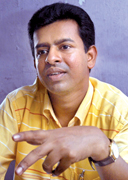
Buddhika Pathirana |
Q: You were the most senior member and the district leader of the
party. What is the reason for your defeat and the party?
|

Joseph Michael Perera |
A: Well, with the resounding victory of the President it is not
possible to win a subsequent immediate election.
This has been proved in the past elections. My personal loss was
mainly due to my type of campaigning. I campaigned for the party in the
district and not for preferences for me.
Those who campaigned only for their numbers were elected and I lost
by a few hundred votes.
Q: Some say that the leader of the party is to be blamed for the
consecutive defeats - what have you got to say?
A: Well, I don't agree with that. We have to accept responsibility
for our defeat.
Buddhika Pathirana - Matara District
District representatives who were in power didn't live up to the
expectations of the public and specially party supporters and that was
why they lost the last election and it is of no relevance to point an
accusing finger at the leadership for the party debacle.
Joseph Michael Perera Gampaha District
It is a widely accepted fact that there should be changes in the UNP
constitution and we are right now in the process of seeking ideas from
all relevant stakeholders of the party and within a short period we will
scrutinise everything and would arrive at a suitable solution.
It is not possible for me to air my personal views as I am in the
committee.
Thalatha Athukorale: Ratnapura District
|
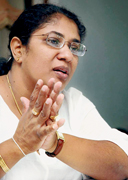
Thalatha Athukorale
|
It is an absolute necessity to make some drastic changes in the party
mechanism to revive the party and guide it to victory at future
elections for which the groundwork is now in progress.
I have submitted my proposals and we hope to work collectively on
this and arrive at an acceptable solution as soon as possible.
Ranjith Madduma Bandara - Moneragala district
|

Ranjith Madduma Bandara |
Decision-making power is centred around the leadership which is not a
democratic feature in our party. We have been clamouring for changes at
every successive defeat with no positive approach to remedy the problem.
It is time that we implement the recommendations of the N.G.P.
Panditharatne committee submitted in 2005 to restructure the party. Had
we complied with those recommendations in 2005 we wouldn't have lost the
subsequent elections.
Better future for UNP
It has been observed that from the leader of the party down to
Pradeshiya Sabha members, all office-bearers including executive
committee members are of the view that some changes should take place in
the party to be positive of a future election victory.
The Think Tank of the party will formulate new strategies to suit the
present requirements to garner public support and counter attack the
government propaganda against the United National Party.
Since the ruling party has solidly consolidated its position, it will
not be an easy task for the United National Party to bounce back unless
and until an aggressive, people-friendly formidable campaign is launched
in the near future. |

